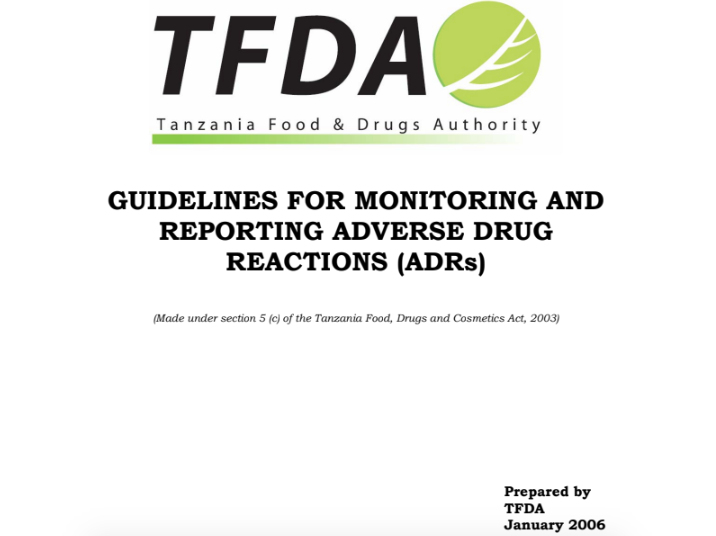Fill out the form below to receive the complete PDF guide directly in your inbox. This resource provides clear, step-by-step guidance to help you make the most of the information we’ve prepared for you.
Tanzania
GUIDELINES FOR MONITORING AND REPORTING ADVERSE DRUG REACTIONS (ADRs)
Issued by the Tanzania Food and Drugs Authority (TFDA), these 2006 guidelines are made under Section 5(c) of the Act and establish the procedure for monitoring and reporting Adverse Drug Reactions (ADRs). They aim to strengthen the weak ADR monitoring system by encouraging reporting of all suspected undesirable patient effects associated with drugs, cosmetics, or medical devices. The document covers what, who, when, and how to report, and provides the necessary ADR Reporting Form. Reporting should be done as soon as possible via phone, fax, or email.

Use Cases
- Healthcare Professionals – Detect and Report Suspected Effects: They should report all undesirable patient effects suspected to be associated with drugs, cosmetics, or medical devices use, even if they are unsure of causality.
- TFDA (Tanzania Food and Drugs Authority) – Process and Analyze Data: The Authority is responsible for processing the collected ADR data to detect new safety signals and evaluate the causality of reported reactions.
- Reporters – Submit Follow-up Information: Any follow-up information for an already reported ADR must be communicated to the TFDA, indicating that it is a follow-up report and linked to the original case.
- WHO Uppsala Monitoring Centre (UMC) – International Data Exchange: Collected data is processed and sent to the UMC for continuous international monitoring.
- TFDA – Disseminate Safety Information: The Authority uses the collected data to prepare feedback and issue safety warnings to the public and healthcare community.
- Pharmacists/Other Staff – Utilize the Reporting Form: They use the standard ADR Reporting Form provided in the appendix to submit cases to the TFDA’s ADR Monitoring Unit.
Key takeaways you'll learn
The resource’s purpose is to implement the monitoring and reporting requirement of the Act by guiding healthcare professionals on the procedures for reporting Adverse Drug Reactions (ADRs) and other adverse events associated with medicinal products.
- Mandate from the Act: The guidelines are made under Section 5(c) of the Tanzania Food, Drugs and Cosmetics Act, 2003.
- Broad Reporting Scope: Reporting extends beyond classical ADRs to include suspected undesirable effects associated with cosmetics and medical devices.
- Reporting Encouraged Even with Incomplete Data: Reporters are encouraged to submit reports as soon as possible, even if they are not sure the product caused the event or if they lack all the details.
- International Collaboration: Collected ADR data is processed and shared with the WHO Uppsala Monitoring Centre (UMC) for global safety signal detection.
- Definition of ADR: An ADR is defined as a noxious and unintended reaction occurring at doses normally used for prophylaxis, diagnosis, or therapy.


